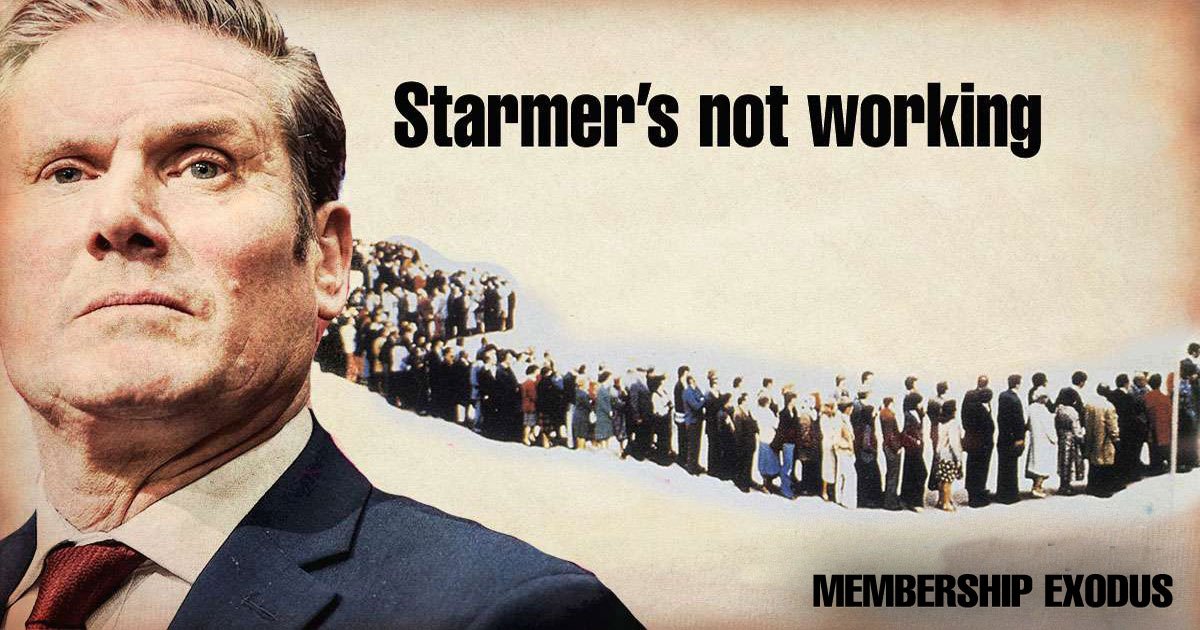Labour’s Membership Meltdown: Starmer’s Struggles as Party Shrinks
Labour membership sinks to lowest level in 10 years under Starmer…
Sir Keir Starmer’s Labour Party has managed to achieve a dubious milestone: its lowest membership numbers in a decade. It seems the Party that once boasted of its grassroots support is now watching those roots wither at an alarming rate.
The figures paint a picture that’s about as pretty as a politician’s promises. Labour shed a whopping 37,000 members in 2023, bringing its total to a mere 370,450. To put that in perspective, it’s as if the entire population of a small city decided to collectively shrug and say, “Nah, we’re good” to Labour’s vision.
This exodus marks a stark contrast to the heady days of Jeremy Corbyn’s leadership when membership swelled to 532,000 in 2019. It seems Starmer’s brand of Labour isn’t quite as intoxicating to the masses as his predecessor’s was or the tame media would have you believe.
But hold onto your party hats, folks, because this isn’t just a minor blip on the political radar. We’re talking about a membership nosedive steeper than a rollercoaster at Wonderworld on Cleethorpes prom. It’s the most dramatic year-on-year plummet since 2003, when Labour members fled faster than their moral conscience could carry them following the Iraq invasion.
You have to wonder: what war is Prime Minister Starmer supporting that’s causing such collateral damage to his own ranks? Perhaps it’s his unwavering backing of Israel’s actions in Gaza. You’d think!

Interestingly, Labour isn’t the only Party grappling with a membership crisis. The Liberal Democrats have lost 11,000 members, while the Conservatives have seen their membership fees drop faster than Matt Hancock’s friend count in a VIP WhatsApp group. And no, it’s not just because the Tory base increasingly resembles a retirement home with a political bias. Political Party membership has become as out of style as a mullet at a job interview.
Between 2019 and 2023, membership of the SNP almost halved from 125,691 to 64,525. Soon they will all be able to fit in a camper van…
Just as ideology has been discarded like political promises, people are abandoning Party politics faster than you can say “disillusioned electorate.” In an era where alternative news and social media expose the cracks in mainstream narratives, committing to a mainstream political party knowing who and what’s pulling their strings now has all the appeal of joining the Manson Family.
Following the money
Labour’s financial losses were less than expected. General secretary David Evans credits this to “an increase in high-value donations.” This is not merely a silver lining; it’s the culmination of a calculated strategy. Labour has brazenly traded its grassroots support for the golden handshakes of big business, morphing into a globalist legislator that prioritises corporate interests over the workers it once championed. The Party of Clement Attlee and Aneurin Bevan has become a willing supplicant at the altar of neoliberalism, abandoning its working-class base for the siren song of corporate donations.
Meanwhile, in the land of the unexpected, Reform UK (yes, that’s Nigel Farage’s latest political vehicle) claims its membership has grown “significantly.” This surge in right-wing populism is not occurring in a vacuum; it’s a direct response to both the collapse of the Tory Party and Labour’s abandonment of its core principles. Unsurprisingly, there’s a pushback from the liberal woke, taking the form of more tribalism—divide and conquer or just divide, it works either way
The result is a dangerous polarisation of the political landscape, with the traditional left now orphaned and former Tories stepping more to the right.
So, what does this all mean for Labour and Starmer?
So, what does this membership exodus mean for Labour and Starmer? It’s certainly not a case of quality over quantity, nor is it a strategic shift towards a leaner, more efficient political machine. Rather, it’s the inevitable result of a rightward lurch and an increasingly authoritarian leadership style. Starmer’s Labour has made a Faustian bargain, trading its soul – and its members – for a chance at power. The Party now finds itself adrift, neither fish nor fowl, too corporate for the left and too timid for the right.
This exodus represents more than just declining numbers; it’s a damning indictment of Labour’s betrayal of its founding principles. As the Party cosies up to big business and embraces neoliberal orthodoxy, it leaves behind the very people it was created to represent. With a supermajority and the next general election 5 years away, it doesn’t matter to Prime Minister Starmer if this strategy pays off, or if Labour finds itself a Party without a people, adrift in the choppy waters of 21st-century politics.
But what of the people?
Some party hack decreed that the people
– Bertolt Brecht
had lost the government’s confidence
and could only regain it with redoubled effort.
If that is the case, would it not be be simpler,
If the government simply dissolved the people
And elected another?
Britain’s Buyer’s Remorse: Labour’s Honeymoon Ends Before It Begins

It seems the British public has developed a severe case of voter’s remorse, and in record time. Just six weeks after handing Labour the keys to Number 10, the electorate is already showing signs of disenchantment with their new tenants.
Prime Minister Starmer, who not so long ago strutted into Downing Street, now finds himself caught in a riptide of disapproval. His net approval rating has nosedived from a comfortable +7 to a precarious 0, according to the latest Opinium poll. It’s a plummet that would make even the most seasoned bungee jumper wince.
But let’s not kid ourselves – was this ever really about Labour’s appeal, or merely the public’s desperation to oust the ‘zombie Tories’? It seems the electorate was so eager to show the Conservatives the door, they didn’t bother to check who they were inviting in.
Now, as the dust settles, reality is setting in. An Ipsos poll conducted between August 9-12 paints a grim picture: 52% of Britons believe the country is “moving in the wrong direction”. It’s as if the nation collectively woke up, looked at its new government, and muttered, “Oh no, what have we done?”
This disapproval isn’t limited to Starmer. His deputy, Angela Rayner, and Chancellor Rachel Reeves are also feeling the chill of public discontent. It’s a stark reminder that in politics, honeymoon periods can be brutally short – if they exist at all.
So here we are, six weeks into a Labour government, and already the public seems to be pining for alternatives. It’s a damning indictment of not just Labour’s performance, but of the state of British politics as a whole.
Are we stuck in a perpetual cycle of disappointment, forever ping-ponging between parties that promise the moon and deliver a pebble? Or is this early dissatisfaction a wake-up call for Labour to start delivering on their lofty campaign promises?
One thing’s for certain: if Starmer and his team don’t turn this ship around soon, they might find themselves joining the Tories in the political wilderness even with a supermajority.
Remember, there’s always someone with more ambition than their current position allows. These eager beavers on the backbenches are eyeing those coveted front bench seats, ready to whisper “no confidence” at the first sign of weakness. An unpopular Prime Minister is extremely weak.
We could be a whisker away from looking less like the cradle of modern democracy and more like the Weimar Republic without the funny moustaches. The halls of Westminster might soon echo with the sound of the long knives being sharpened rather than debates being held.
Welcome to modern British politics, folks. Where the honeymoon ends before the wedding cake is even cut.
Of course, Prime Minister Starmer is still using the tried-and-true tactic of blaming the previous government. It’s the political equivalent of “the dog ate my manifesto”, it’s also very weak, isn’t it?
But no matter how he keeps pointing fingers at the ghosts of Tories past the public demands he actually govern?
The British public, has a remarkably short patience for excuses, no matter how well-crafted they might be. We want the ‘change’ that was promised not more of the same
Ultimately, We the people are voiceless in our own house, the House of Commons…
Support Independent Journalism Today
Our unwavering dedication is to provide you with unbiased news, diverse perspectives, and insightful opinions. We're on a mission to ensure that those in positions of power are held accountable for their actions, but we can't do it alone. Labour Heartlands is primarily funded by me, Paul Knaggs, and by the generous contributions of readers like you. Your donations keep us going and help us uphold the principles of independent journalism. Join us in our quest for truth, transparency, and accountability – donate today and be a part of our mission!
Like everyone else, we're facing challenges, and we need your help to stay online and continue providing crucial journalism. Every contribution, no matter how small, goes a long way in helping us thrive. By becoming one of our donors, you become a vital part of our mission to uncover the truth and uphold the values of democracy.
While we maintain our independence from political affiliations, we stand united against corruption, injustice, and the erosion of free speech, truth, and democracy. We believe in the power of accurate information in a democracy, and we consider facts non-negotiable.
Your support, no matter the amount, can make a significant impact. Together, we can make a difference and continue our journey toward a more informed and just society.
Thank you for supporting Labour Heartlands









